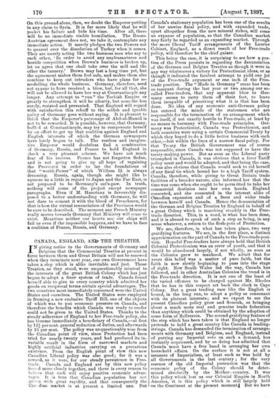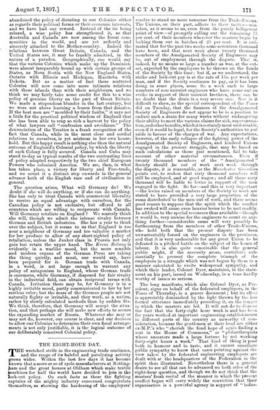CANADA, ENGLAND, AND THE TREATIES.
IN giving notice to the Governments of Germany and Belgium that the Commercial Treaties at present in force between them and Great Britain will not be renewed when they terminate next year, our own Government have taken a step which is alike inevitable and just. Those Treaties, as they stood, were unquestionably inimical to the interests of the great British Colony which has just begun to adopt a freer system of trade. Canada found herself able to give to every country which admitted her goods on reciprocal terms certain special advantages. The two countries most immediately concerned were the United States and ourselves. The United States were employed in framing a new exclusive Tariff Bill, one of the objects of which was to put economic pressure on Canada, and 'therefore the benefits which Canada was ready to confer could not be given to the United States. Thanks to the steady' adherence of England to her Free-trade policy, she has become immediately a beneficiary of Canada,—at first by l2 per cent. general reduction of duties, and afterwards by 25 per cent. The policy was unquestionably wise from the Canadian point of view, since Protection had been tried for nearly twenty years, and had produced its in- variable result in the form of narrowed markets and highly artificial industries carrying on a precarious existence. From the English point of view this new Canadian. Liberal policy was also good ; for it was a reward, as it were, for our steady persistence in Free. trade. Canada and England are by this new policy boui:d more closely together, and there is every reason to believe that each will enjoy positive economic advan- tages. It is true that Canadian population has not grown. with great rapidity, and that consequently the Can: diem market is at present a limited one. But Canada's stationary population has been one of the results of her unwise fiscal policy, and with expanded trade, apart altogether from the new mineral riches, will come an expanse of population, so that the Canadian market may fairly be regarded as an expanding market. Through the more liberal Tariff arrangements of the Laurier Cabinet, England, as a direct result of her Free-trade policy, will therefore be the chief gainer.
This being the case, it is surprising to see how a por- tion of the Press persists in regarding the denunciation of the German and Belgian Treaties as though it were in any way whatsoever a victory for Protectionist ideas, or as though it indicated the faintest attempt to yield one jot of the Free-trade argument or one inch of the Free- trade position. The "Made in Germany" craze has been so rampant during the last year or two among our so- called Free-traders, that any apparent blow to Ger- many seems to carry them off their feet, to leave them incapable of perceiving what it is that has been done. No idea of any economic anti-German policy has entered the minds of the statesmen who are responsible for the termination of an arrangement which was itself, if not exactly hostile to Free-trade, at least by no means in harmony with Free-trade principles. Ger- many was Protectionist, Canada wan Protectionist, and both countries were using a certain Commercial Treaty by which they hoped to do a little better business with each other,—but within the lines of a narrow fiscal policy. For that Treaty the British Government was of course responsible, since Canada was not supposed to have the treaty-making power. But as soon as the Liberal party triumphed in Canada, it was obvious that a freer Tariff policy must and would be adopted, and that being the case, it was also obvious that Canada would seek to rid herself of any fiscal tie which bound her to a high Tariff system. Canada, therefore, while giving to Great Britain trade facilities of a broader nature, also informed her that the time was come when she ought to be permitted to take her commercial destinies into her own hands. England consented, and she consented in the interest alike of Canadian expansion and of a freer and wider trade between herself and Canada. Hence the denunciation of the German and Belgian Treaties by England in behalf of a great Colony which is marching steadily in the Free- trade direction. This, in a word, is what has been done, and it is absurd to speak of such a step as being, in any sense whatever, a return to the flesh-pots of Protection.
We see, therefore, in what has taken place, two very gratifying features. We see, in the first place, a distinct approximation on the part of Canada to the Free-trade posi- tion. Hopeful Free-traders have always held that British Colonial Protectionism was an errOr of youth, and that it would be abandoned largely, if not wholly, as soon as the Colonies grew to manhood. We admit that for years this belief was a matter of pure faith, but the faith is now slowly beginning to pass into the stage of sight. New South Wales led the way, Canada has followed, and in other Australian Colonies the trend is in the Free-trade direction. It is not one of the least of the varied offences to be charged against Mr. Rhodes that he has in this respect set back the clock in Cape Colony. But a great trading race like the English is bound, in the long run, to adopt a policy so consonant with its plainest interests; and we expect to see the present Canadian policy grow and flourish, so bringing about a much more real and genuine trade federation than anything which could be obtained by the adoption of some form of Zollverein. The second gratifying feature of the step which has been taken is that England no longer pretends to hold a great country like Canada in leading- strings. Canada has demanded the termination of arrange- ments with Germany and Belgium, and England, instead of putting any Imperial veto on such a demand, has instantly acquiesced, and by so doing has admitted that Canada must have a free hand in arranging her own household affairs. On the surface it is ' not at all a measure of Imperialism, at least such as itas held by all Governments in the last century ; fel- the very essence of the old Imperial pretension was that the economic policy of the Colony should be deter- mined absolutely by the Mother- country. It was this policy which lost us our Colonial Empire in North America, it is this policy which is still largely held on the Continent at the present moment.' But we have abandoned the policy of dictating to our Colonies either as regards their political forms or their economic interests, and we have had our reward. Instead of the tie being relaxed, a wise policy has strengthened it, so that Australia and Canada are now among the freest com- munities in the world, and are yet ardently and sincerely attached to the Mother-country. Indeed the relations between Great Britain, Canada, and the United States are, it may be frankly admitted, in the nature of a paradox. Geographically, one would say that the various Colonies which make up the Dominion were almost inseparably bound up with certain groups of States, as Nova Scotia with the New England States, Ontario with Illinois and Michigan, Manitoba with Dakota. But as a matter of fact these scattered Colonies will now come into more intimate relations with these islands than with their neighbours, and we think we may fairly take some credit for this to a wise policy of genuine liberty on the part of Great Britain. We made a stupendous blunder in the last century, but we were not above learning a lesson from that disaster. If the best men are "moulded by their faults," it says not a little for the practical political wisdom of England that she has been able to reap so rich a harvest by the policy of what lawyers call "confession and avoidance." The denunciation of the Treaties is a, frank recognition of the fact that Canada, while in the most close and cordial relations to ourselves, is yet mistress in her own house- hold. But this happy result is nothing else than the natural outcome of England's Colonial policy, by which the liberty of each Colony is fully secured. Canada and Cuba may stand to-day as typical results of the two contrasting lines of policy adopted respectively by the two chief European Powers who colonised America. We see, then, in what has taken place, a victory for liberty and Free-trade, and we count it a distinct step onwards in the general advance both of the English race and af civilisation in general.
The question arises, What will Germany do? We doubt if she will do anything, or if she can do anything. She has only to treat Canada with commercial liberality to receive an equal advantage with ourselves, for the Canadian policy is not exclusive, but offered to all countries which are willing to reciprocate with Canada. Will Germany retaliate on England ? We scarcely think she will, though we admit the intense rivalry between German and British industries. She has a year to think over the subject, but it seems to us that England is too near a neighbour of Germany and too valuable a market for her produce to allow of any short-sighted policy of retaliation, unless the Junker class in Prussia not only gain but retain the upper hand. The Kreuz Zeitung is evidently in a warlike mood, but the more sensible and modern organs of the German Press are taking the thing quietly, and must, one would say, have been prepared for it. German trade with Canada, in a word, is not large enough to warrant any policy of antagonism to England, whose German trade is enormous, while Germany, if disposed for fair rivalry in the industrial field, can obtain reciprocal terms with Canada. Irritation there may be, for Germany is in a highly irritable mood, partly communicated to her by her restless ruler; but the mass of the German people are not naturally flighty or irritable, and they work, as a nation, rather by slowly calculated methods than by sudden fits. We think, therefore, that Germany will accept the situa- tion, and that perhaps she will make new efforts to secure the expanding market of Russia. Whatever she may or may not do, however, our course is clear, and our decision to allow our Colonies to determine their own fiscal arrange- ments is not only justifiable, it is the logical outcome of our deliberately conceived Colonial policy.



































 Previous page
Previous page